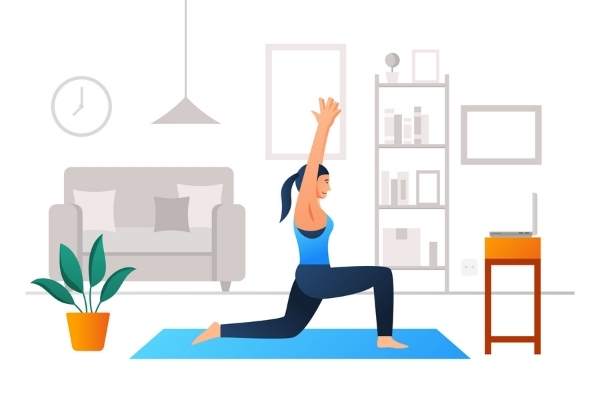“A Wandering Mind is an Unhappy Mind” – Matthew A. Killingsworth & Daniel T. Gilbert.
Imagine, if you had a rough and stressful week, what do you hope to have and to be?
Yes! Most of us would like to escape from all these non-stop nagging stresses, annoyance and frustration. Well, one way to achieve this is through practicing Mindfulness to help us relax and calm our mind down. However, there is no quick way or short-cut for achieving this calm state of mind. It requires dedication, patience, and consistency. Thus, if you’ve heard friends talking about mindfulness or you’ve had people recommending it, it’s good that you know how to execute it.
In this article, we’ll discuss how mindfulness can help us in our daily lives, improve our mental and physical health, and give you some tips on practicing mindfulness.
What Is Mindfulness?
Mindfulness is the mental state of focusing on our awareness of the present and accepting our thoughts and feelings happening at the present moment without judgment. Perhaps, the simplest way to understand mindfulness is to view mindfulness as a way of practicing paying attention in whatever we are doing at the present moment. Such as what this old proverb states: ‘When a wise man walks, he just walks; when he sits, he just sits; and there’s nothing else going on.’
Does that sound difficult or enticing to you – just do what you’re doing now and there is no worry about anything else?
Mindfulness helps connect our emotions with bodily sensations without judgment to achieve a complete sense of harmony within ourselves. Relaxation will come by as a ‘side effect’ (a good one) after practicing mindfulness. Thus, it is therapeutic if we can accept our flaws and acknowledging situations after stressful encounters with mindfulness.
How Does Mindfulness Help Us with Our Daily Life?
Being mindful is our natural state. This could be observed easily in a little child – when a child is happy, he/she laughs freely, when a child is sad, he/she just cries. Everything to them is about their current state, there is no control needed, they just pay attention at their present emotion and body sensations.
Mindfulness makes us perceive life in a more accepted and forgiven manner, without trying to control the uncontrollable situations and emotions. To be happy and peaceful, we have to learn to accept those unwanted situations and let go of things or people that we cannot hold on anymore. Thus, being mindful helps improve our mood and builds positive energy, which in turn help us focus on things that could help us grow in numerous aspects. If we think positively, achieving our goals becomes a cinch. Anyone who allows stress, anxiety, or depression to take over their thoughts ceases to exist in the present and tends to worry about unknown future or ruminate on the past irreparable mistakes.
How Does Mindfulness Improve Our Mental and Physical Health?
Mindfulness is helpful to our mental and physical health in numerous ways. This therapeutic method has become the focus for treating mental health issues by psychotherapists worldwide and has proved fruitful. Mindful meditation is a standard way of recapturing thoughts and feelings and to channel negative energy into a positive, helpful aura. This healing potential is substantial in the following forms.
- Improving mental health
We become more conscious about ourselves and our thoughts in the present while acknowledging and accepting our past and reduce worrying of the future. This way, we create peace with ourselves and dismiss the destructive energy that builds negativity, leading to depression and escalated anxiety. In addition, being conscious of the present – and focusing on it – makes us understand ourselves more comprehensively.
- Improving our physical health
The effects of a fully relaxed state of mind seamlessly trickle down to our physical wellbeing. For example, mindfulness helps treat heart diseases and improve gastrointestinal complications. Mindfulness can help improve the quality of sleep by reducing stress and anxiety and promoting relaxation. This can lead to better overall health and a more rested mind and body.
Mindfulness Practice Tips
Here are some tips on practicing mindfulness:
- Mindful Meditation
Mindful meditation allows us to dismiss perturbing thoughts and distorted personal judgment, thus invoke positively streamlined thoughts and build constructive energy within us. Everyone can achieve it, and it only takes the concerted effort of the brain and the body to achieve perpetuity and tranquility. Here’s how you can practice mindful meditation.
– Lie or sit in a comfortable position
– Close your eyes
– Breathe in and out naturally and slowly by visualizing the air going in from the nostrils, passes through your throat, your trachea, and goes all the way into your lower abdomen, and breathe out very slowly by squeezing your lower abdomen to allow the air to move all the way up and breathe out from the nostrils.
– Focus your attention on your breath.
– When thoughts come in, just observe them without judgment. Do not catch onto the thoughts and flow with the thoughts. If that happened (which will definitely happen for beginner), put your attention back to your breath.
– Start this mindful breathing meditation with three minutes and slowly extended to 20 minutes after some time of practicing. Be patience. Remember, ‘Rome wasn’t built in a day’.
- Mindful eating
Eating has a primary purpose of making us full and nourishing our bodies, so eating with mindfulness is outmost essential.
By eating every bite of food and swallowing them in a subtle and mindful way – with pleasure and gratitude, we will enjoy the food more and appreciate the effort of ourselves and others who have helped in preparing the food and setting it on the table. Appreciation is vital in mindfulness as it helps us focus on the day-to-day milestones, we’ve been successful in reaching. To practice mindful eating, do the following:
– Take deep breaths before eating.
– Evaluate your hunger before eating. Dismiss thoughts and pull the entire focus on how your body feels.
– Eat the amount that satisfies you. The reason for mindful eating is to allow food to make you feel relaxed rather than discomfort. Therefore, eat what your stomach can handle.
– Eat peacefully and don’t rush. Take deep breaths while eating and enjoy every bite.
- Mindful pauses
While at work or school, it’s good to take pauses and evaluate ourselves. Our slow brains need rechanneling to take control over the fast brain. Typically, allowing the slow brain to control our actions slows us and controls the constant spiraling of thoughts that can pitch out of control. Allow yourself to breathe and re-strategize so that the going doesn’t feel burdensome. Here are ways of practicing mindful pauses.
– Internalize and analyze your prospective steps. Please don’t allow your fast brain to take over as it escalates your cognitive thinking and provokes uncalculated actions.
– Create new patterns. If your current path doesn’t seem to work, try another one and another. Don’t allow yourself to dwell on what doesn’t seem to work.
- Mindful workouts
A mindful workout allows you to feel stronger and able, rather than feeling perturbed. The goal is to synchronize the mind, body, and nervous system to achieve perpetuity, thus helping you to focus on the present. You can do this through any exercises that you enjoy doing, such as simple yoga, taking a walk in the park, riding a bicycle, etc. Here are ways to practice mindful workouts.
– Establish your objective. Workouts are goal-oriented, and it’s good that you have one. Make that goal clear if it’s running a few miles down the streets or on a treadmill.
– Warm-up a bit. Before venturing into your workout, prepare your mind and work your muscles while taking a deep breath to prepare for the strenuous exercise.
– Choose a flow and tempo. While working out, choose a rhythm and level up to it. Channel your breath and thoughts such that it feels more meditative.
– Steam down and relax. Once it’s over, wash down and find a fantastic place to relax. Pull the focus on how your body feels while taking deep meditative breaths.
Conclusion
Mindfulness is a powerful remedy to help us reduce destructive thoughts that build negative energy of self-doubt and disapproval. It allows us to focus on the present and use our past experiences positively rather than seeing them as dark shadows trailing us. For what’s worth, make mindfulness a habit, and you’ll approach life positively.
- McKenzie, S., & Hassed, C. (2012). Mindfulness for life: how to use mindfulness meditation to improve your life. London: Robinson.















